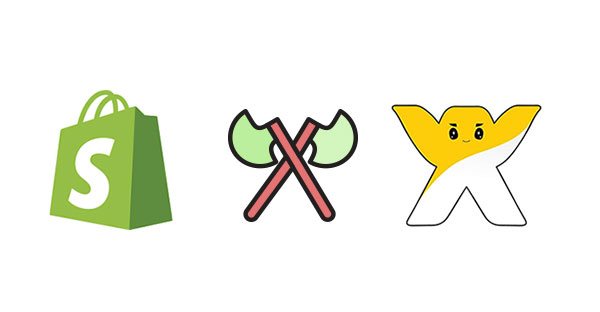So you want to start an online store but you’re not sure where to start? Check out this comparison of two of the top platforms in our Shopify versus Wix showdown.
After you read this, then check out our Ultimate Guide for Starting an Online Boutique. Just get online! Retailing as of the moment has shifted to digital as seen by the rise of mobile shopping. It is no doubt that online stores can easily reach more people, thanks to the over two billion Internet users around the globe. This is not to say bricks and mortar stores are dead. Businesses have just found a way to reinvent the kind and the way their offer their services to keep up with market leaders.
Before you can launch your own online store, you need a tool to help you. And this is where eCommerce platforms come in. eCommerce platforms are basically the backbone of any online retail enterprises. They offer support like listing your products, managing shopping carts, and processing orders. Most have themes, add-ons, and integrations to allow you to customize.
But beyond the structure, eCommerce platforms are growth enablers. They allow organizations to expand its eCommerce offering to provide a continuous client experience and ultimately control its own future.
There is an undeniable growing presence of eCommerce apps these days. Some help small individuals dispose of their goods, while others are for large enterprises with huge sales volumes and warehouse inventories.
Two of the famous names in the eCommerce platforms are Shopify and Wix. Today, we are going to look at their features, strengths, and weaknesses to see which will suit your need as a soon-to-be seller.
Shopify

This Canadian-based eCommerce solution is a good option for people who want to convert their businesses into online stores. Dubbed as a king of the eCommerce industry, Shopify works with starting-up entrepreneurs, big brand names, and several storefronts.
Shopify was founded in 2004. Since then, it has a sharp focus on trending social commerce and mobile shopping. And despite the increasing competition, Shopify always manages to keep up with the evolving eCommerce trends.
The platform is easy to use, and you can choose your Shopify packages. Prices can range between $29 and $299 per month, based on your requirements and budget.
Features
- Integrates with social networking sites like Facebook and Twitter to sell
- Has more than 60 flexible themes with options to customize some sections
- Unlimited products and variants
- Easy product configuration and multiple product pictures
Pros
- Abandoned cart recovery
- Contains a plethora of themes, plugins, and extensions
- Has mobile-friendly shopping cart and seller mobile apps
- 24/7 technical support via live chat and phone
- Has more than 70 payment gateways
- Has support for automatic tax rates for different countries
Cons
- Charges an additional transaction fee if Shopify Payment is not used
- Some useful and practical extensions need improvements
- Its own coding language requires online store owners to pay an incremental price for customization
- Email and domain hosting is not included
Wix

Wix, on the other hand, has found its niche on people who love some pristine, attention-grabbing pages and easy-to-maneuver customer interfaces. By the way, not all users of WIX are selling items online. This all-inclusive website can directly compete with Weebly, Squarespace, and WordPress.com. This Israel-based site was founded in 2006.
Wix offers a free plan, but you are required to use its subdomain. You also need to display its ads, and you have limited functionality. Switch to premium plan if you do not want any of these things. Price can range between $5 and $25 per month depending on the plan you choose.
Features
- Artificial Design Intelligence makes designing a site quick and easy
- Uses the WYSIWYG (What You See Is What You Get) system
- Has an enormous library of more than 510 customizable HTML5-based templates and a handful of Flash-based templates
Pros
- Suitable for DIY-ers as it is easy to learn and configure
- Drag and drop interface is very easy to use
- Features a solid, professional-looking collection of modern themes
- Intuitive Help Features quickly direct you to official support channels
Cons
- Ads are visible on the free version
- You can’t swap templates without losing all the customization work you have done
- Changing templates is a bit difficult
Comparison of Shopify and Wix

eCommerce Features
An eCommerce store has five basic features. These include product database, shopping cart, checkout page, payment processor, and order database.
Shopify has fewer presentation features compared with Wix. It only allows you to add three variants for size, color, or material. Wix can give six with up to 30 options. Both let you write titles and descriptions. Their image galleries can also be zoomed in and out. However, Shopify offers more options and flexibility with a wide variety of free and paid add-ons.
For payment processing, Shopify has more options. It accepts PayPal, credit card payments, POS, offline payments, Apple Pay, and other channels like Facebook, Pinterest, Twitter, or Amazon. Meanwhile, Wix only accepts payments made via PayPal, credit cards, POS, and offline payments. Do note though that Shopify will charge an additional transaction fee for those who live outside Australia, Canada, Ireland, Singapore, the US, and the UK.
Before checking out, Shopify will offer you to register an account with them. It can be mandatory, optional, or prohibited. As the site owner, you can add users manually or import a list through CSV. You can arrange this later via a tagging system. None of these is offered in Wix.
However, do note though that Shopify is an exclusive eCommerce platform, while Wix is an all-around. As mentioned earlier, Wix can technically compete more with other website builders like Weebly and Squarespace. That being said, Shopify is best for those whose sole purpose is for eCommerce alone. But if you need an integrated eCommerce website builder, then go for Wix.
Ease of Use
Shopify never said its platform is the easiest to use. But you can set up your own store within a few minutes after several clicks. Adding products and variants is no sweat on this platform too. And in case you need a hand, helpful tutorial links are readily available. However, configuring the site takes some time say, a good couple of hours.
Wix, on the other hand, boasts of its user-friendly interface. And that is very true to the core. Setting up your website via Wix is a breeze. There is quick access to tutorials and step-by-step guides. Wix also has the Wix ADI that uses artificial intelligence to produce ready-made templates in a jiff.
So when it comes to ease of use, nothing beats Wix by far.
Support and Service
Shopify provides more channels to tend to its customers round the clock. You can contact them via phone, chat, email, forums, and social media. Aside from dealing with technical issues, Shopify has excellent marketing blogs that will give you tips on how to grow your business.
Wix also has a support center, but it can only be accessed via phone or forums within business hours. But it has a huge community as well as well-written blogs and tutorials.
Clearly, Shopify wins in this area.
Conclusion
Choosing what platform to use basically boils down to your personal preference. Based on the review above, both share some similarities and differences, but they are not exactly under the same category.
Choose Shopify if you want to focus on your eCommerce store and incorporate all features possible like automatic shipping cost and tax calculator. It offers drop shopping business too and has more payment gateways.
Wix is best if you want the easiest way to build an online store. As mentioned earlier, online selling is not its main goal so use this if you plan to add some creative contents to your page. It has a simple drag and drop feature with more design flexibility.
We hope this review has clarified a few things for you.

